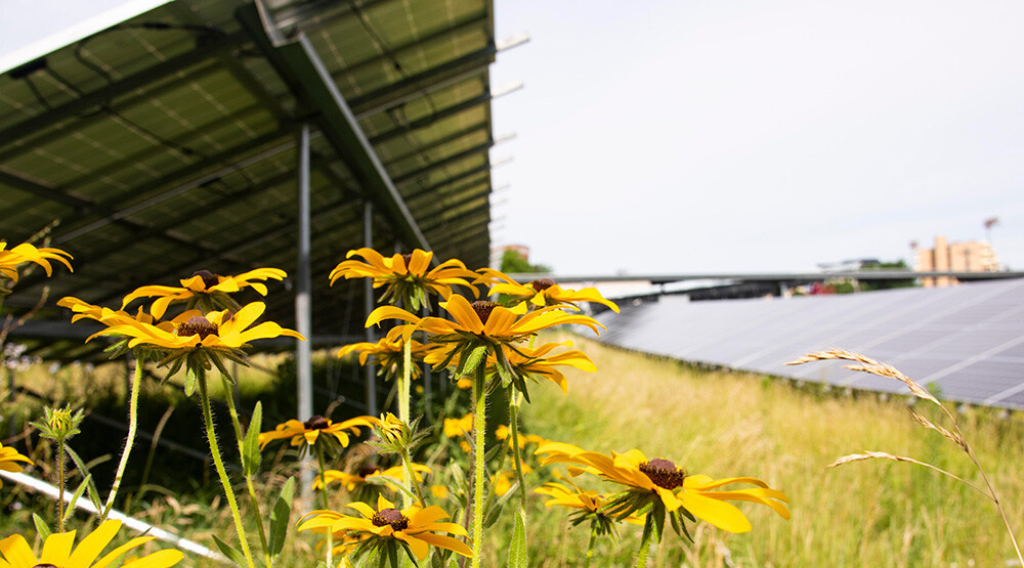
Photo by Brandon Stengel for BWBR Architects, Inc (www.bwbr.com)
The Great Plains Institute (GPI), along with our project partners, is excited to share a new report for a project focused on creating a model to overcome the significant barriers for underserved Black, Indigenous, and people of color (BIPOC)- and immigrant-owned small businesses to access rooftop solar energy.
The Advancing Small Business Solar Equity: Final Technical Insights Report is the culmination of nearly three years of partnership focused on the small business corridors most impacted by the civil unrest after the murder of George Floyd, including West Broadway in North Minneapolis, Lake Street in South Minneapolis, and the University Avenue-Midway area of Saint Paul. With this report, we aim to bring energy efficiency and associated cost-savings to Lake Street businesses.
This partnership builds on a nearly decade-long relationship between GPI and the project lead Lake Street Council, a nonprofit serving Lake Street’s diverse small business corridor.
The following partners rounded out the project team:
- The Northside Economic Opportunity Network and the Neighborhood Development Center, small business-serving community-based organizations representing the West Broadway and University Avenue-Midway corridors, respectively.
- William Weber Consulting, providing facilitation and clean energy expertise.
- The Cities of Minneapolis and Saint Paul, providing in-kind support.
- Xcel Energy, the utility serving the team’s three focus corridors, providing in-kind support.
This project was funded through Round 3 of the National Renewable Energy Laboratory’s Solar Energy Innovation Network (SEIN), a US Department of Energy program that helps communities develop transformative ways of adopting solar energy. GPI participated in the previous Round 1 and Round 2 of SEIN.
The Advancing Small Business Solar Equity team approach and outcomes
The report comprehensively documents the team’s research process and findings, the proposed Solar Hub Network model to improve solar access for underserved small businesses, and the team’s next steps for implementation. Key highlights of the report include the following:
Project principles: A list of six key principles our team developed to guide our work—fostering partnership, cultivating trust, exercising transparency, building wealth, understanding risk, and practicing respectful language.
Research and interview process: Our team used ‘human-centered design‘ principles to guide our research interviews and ensure we were understanding, empathizing with, and centering the perspectives of the people our proposed model would be serving. We conducted many interviews with business owners, solar installers, and other experts in solar and finance. Our findings on barriers to rooftop solar for underserved small businesses went on to inform our proposed Solar Hub Network model.
Solar Hub Network model: Our research confirmed that the Twin Cities already have a relatively robust environment to support small business solar development but that it is difficult for small business owners to navigate. Rather than developing a new product, our team proposed a Solar Hub Network model, which repackages existing solar and incentive programming and embeds solar expertise within the community-based organizations that small businesses already engage with. The team anticipates this model could be replicated beyond the Twin Cities metropolitan area.
Additional resources to inform future program development: The research process of this report led to many additional understandings and considerations in the field of small business solar, which are detailed in the report’s appendices.
Additionally, the team developed one-pager documents highlighting these key insights for two specific audiences: policy and decisionmakers and communities and project partners.
Next steps for the Advancing Small Business Solar Equity team
Due to the numerous partnerships built and strengthened throughout the duration of this project, the Advancing Small Business Solar Equity team is well-equipped to begin implementing the Solar Hub Network in our identified underserved small business corridors.
Looking forward, the team is already identifying funding sources to continue this work and is looking to expand the scope beyond just solar to also include energy efficiency and electrification.
The team has an ambitious plan and goals for 2024:
- Develop a training program for partner community-based organization staff members to embed staff expertise in solar, energy efficiency, and electrification.
- Seek opportunities for community lenders to take advantage of the new Minnesota Climate Innovation Finance Authority and develop innovative green financing products that work for small businesses.
- Support partner community-based organizations in developing a trusted and local vendor list for the small businesses they serve.
- Pilot Solar Hubs at partner community-based organizations to support small businesses in each corridor.
The team is excited to continue the sustainable and clean energy rebuild of Lake Street, West Broadway, and University Avenue. Stay tuned for more updates as this project continues to develop.
Read the SEIN Round 3 Advancing Small Business Solar Equity: Final Technical Insights Report.


